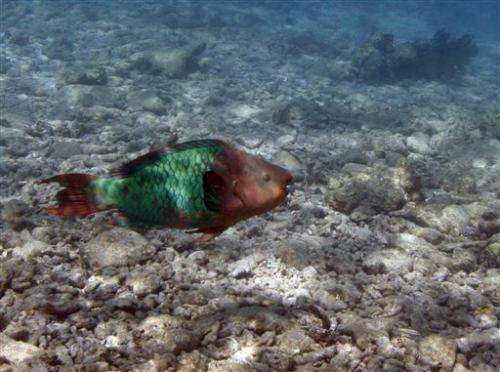Study: Carib reefs need parrotfish, sea urchins (Update)

Colorful parrotfish and spindly sea urchins are the key to saving the Caribbean's coral reefs, which may disappear in two decades if no action is taken, a report by several international organizations said Wednesday.
The report, which analyzed the work of 90 experts over three years, said Caribbean reefs have declined by more than 50 percent since the 1970s. It said that while many experts have blamed climate change for the problem, a drop in the populations of parrotfish and sea urchins is largely responsible.
Parrotfish and sea urchins feed off seaweed, and a drop in their numbers has led to an increase in seaweed, which smothers coral reefs, Jeremy Jackson, lead author of the report, said.
"The situation is truly horrific in the sense that you have all these places that are desperately overfished," Jackson said in a phone interview from Australia.
He said the main culprits in reef degradation are overfishing, coastal degradation and diseases introduced to the region.
"Climate change for me so far is 10 percent of the story," said Jackson, a senior adviser with the Swiss-based International Union for Conservation of Nature, which issued the report with the United Nations Environment Program and the Global Coral Reef Monitoring Network.
Mark Eakin, coral reef watch coordinator for the National Oceanic and Atmospheric Administration, said the report understates the impact of ocean warming.
"It's something that I would say they overlook in their studies," said Eakin, who contributed to the report but was not directly involved in it. "We really need to deal with climate change."
He said there have been at least six substantial bleaching events in the last 30 years, with warm ocean waters forcing the reef organisms to eject the colorful algae that live in their tissues.
The last bleaching event occurred in 2010, but a 2005 episode was the most severe, with up to 90 percent of corals in parts of the eastern Caribbean affected and more than half of them dying.
Eakin agreed with the report's other findings. "For a lot of the Caribbean, the reefs are already devastated," he said. "It's not a surprising result."
The Caribbean has nearly 8,000 square miles (20,720 square kilometers) of coral reefs, most of which are in very poor health. Some island nations have taken steps to control overfishing, but experts say more work is needed.
Caribbean reefs are estimated to generate some $3 billion annually in tourism and fishing, and some environmentalists in the region have taken to planting fast-growing coral species in hopes of improving coral cover.
The U.S. government has gotten involved as well, prohibiting in 2011 the harvest in U.S. Caribbean waters of the three largest parrotfish species: blue, midnight and rainbow. It also limited recreational harvesting of parrotfish.
© 2014 The Associated Press. All rights reserved.


















